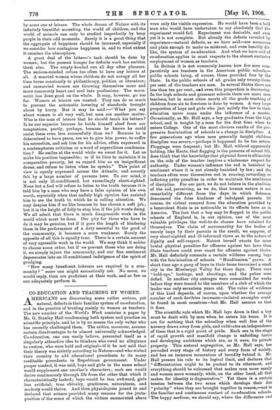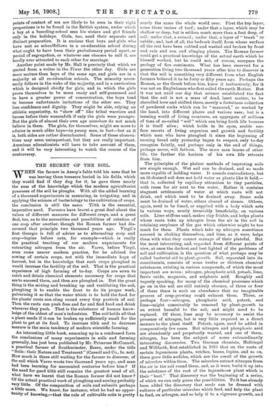CO-EDUCATION AND TEACHING BY WOMEN.
AMERICANS are discovering some rather serious, yet natural, defects in their familiar system of co-education, and in the practice of trusting mainly to women as teachers. The new number of the World's Work contains a paper by Mr. G, Stanley Hall condemning both system and practice on scientific principle, and he is by no means the only writer who has recently challenged them. The critics, moreover, assume certain disadvantages to be almost universally acknowledged. Co-education, one can easily believe, presented itself as a singularly attractive idea to thinkers who owed no allegiance to custom, who were bold and original—if it be not said that their theory was strictly according to Nature—and who wished their country to add educational precedents to its many creditable precedents in Republican government. Under proper control, it was said, boys and girls in the same school would supplement one another's characters ; each sex would derive continuously through life from the other that which it characteristically lacked ; boys would be less awkward, girls less artificial; true chivalry, gentleness, naturalness, and modesty would thrive. And then physiologists joined in and declared that science provided many reasons for the juxta- position of the sexes of which the virtues enumerated above were only the visible expression. He would have been a bold man who would have undertaken to say absolutely that the experiment would fail. Experiment was desirable, and even yet it is not complete. But already the defects revealed by experience—natural defects, as we have said—are numerous and plain enough to make us mistrust, and even heartily dis- like, the system of co-education. And what we have said of co-education applies in most respects to the almost exclusive employment of women as teachers.
In Britain it is not commonly known how few men com- paratively are teachers in the American public schools,— public schools being, of course, those provided free by the State. In the publio schools of all grades only twenty-three per cent. of the teachers are men. In several States there are less than ten per cent., aid even this proportion is decreasing. In the high schools and grammar schools there are more men teachers, but in most cities nearly all the grade teaching of children from six to fourteen is done by women. A very large proportion of boys and girls who just satisfy the law in their education never come under the influence of a master. Occasionally, as Mr. Hall says, a boy graduates from the high school, and is taught by a man for the first time when he enters College. One of the most obvious results of the pro- gressive feminisation of schools is a change in discipline. A few generations ago when men generally taught children discipline was severe,—perhaps it happened to be too severe. Floggings were frequent; but Mr. Hall, without apparently holding, like Keate, that flogging is the panacea of school life, does think that the knowledge that physical force is ultimately on the side of the teacher inspires a wholesome respect for authority. Under woman's influence the rod, is banished by sentiment where it is not already banished by law; and the teachers often wear themselves out in coaxing, rewarding, or inflicting petty penalties in order to maintain the semblance of discipline. For our part, we do not believe in the abolition of the rod, perceiving, as we do, that human nature is not remarkably different from the days in which Solomon denounced the false kindness of indulgent parents. Of course, its virtual removal from the education provided by a benevolent State is as noticeable in its effects here as in America. The fact that a boy may be flogged in the public schools of England is, in our opinion, one of the most valuable privileges the well-to-do classes have retained for themselves. The claim of sacrosanctity for the bodies of unruly imps by their parents is the result, we suppose, of very short-sighted and ill-informed views as to the nature of dignity and self-respect. Nature herself exacts far more brutal physical penalties for offences against her laws than State teachers could ever exact for offences against theirs. Mr. Hall definitely connects a certain wildness among boys with the feminisation of schools. " Hoodlumism " grows. A short time ago a gang of boys in their teens terrorised a small city in the Mississippi -Valley for three days. There were "hold-ups," lootings, and shootings, and the police were defied. • In another city outrages were committed for weeks before they were traced to the members of a club of which the leader was only seventeen years old. The value of evidence of this kind depends, of course, upon whether the average number of such devilries increases—isolated examples could be found in most countries—but Mr. Hall assures us that it does.
The scientific rule which Mr. Hall lays down is that a boy must be dealt with by men when he enters his teens. It is not for nothing that the schoolboy when well free of the nursery draws away from girls, and cultivates an independence of them that is a rigid point of pride. Each sex in the stage of rapid growth and manifold change is unfolding tastes and developing ambitions which are, as it were, its private property: This natural segregation, as Mr. Hall says, has pervaded every stage of history and every form of society, and has an immense momentum of heredity behind it. Mr. Hall presses his rule to its logical limit, and declares that "differentiation ought to be pushed to its uttermost, and everything should be welcomed that makes men more manly and women more womanly, while, on the other hand, all thit makes for identity is degenerative." Yet there is a certain tension between .the two sexes which develops their due "polarity" when they are brought together in reason,—not in the familiar and continuous contact of co-education schools. The happy medium, we should say, where the differences and
points of contact of sex are likely to be seen in their right proportions is to be found in the British system, under which a boy at a boarding-school sees his sisters and girl friends only in the holidays. Girls, too, need their separate and distinct preparation. It is curious that boys and girls who have met as schbolfellows in a co-education school during what ought to have been their probationary period apart, or period of segregation, or whatever one chooses to call it, are hardly ever attracted to each other for marriage.
• Another point made by Mr. Hall is precisely that which we quoted from a writer in the Times the other day. Girls are more mature than boys of the same age, and girls are in a majority at all co-education schools. The minority neces- sarily follows in the wake of the majority, and in a curriculum which is designed chiefly for girls, and in which the girls prove themselves to be more ready and self-possessed and to have a greater power of concentration, the boys tend to become unfortunate imitations of the other sex. They lose confidence and dignity. They might be able, relying on athletic superiority, to "show off " like tribal warriors and heroes before their womenfolk if only the girls were younger. But the girls of almost their own age somehow do not much believe in them. The girls, for themselves, might see more to admire in much older boys—in young men, in fact—but- as it is, both sides are rather disenchanted. Some of these observa- tions may seem unimportant, but they are really important. American educationists will have to take account of them, and it will be very interesting to watch the course of the controversy.















































 Previous page
Previous page